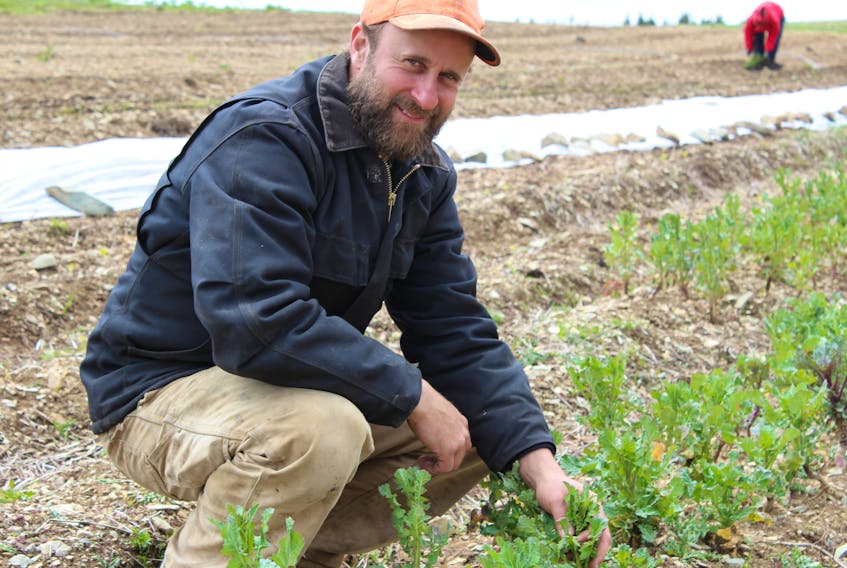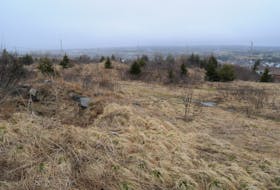There’s a particular coolness factor to Mark Wilson’s approach to farming.
He runs the farm truck on vegetable oil, repurposes things like discarded election signs to hold seedlings planted in soil pods — created by a special tool that replaces moulded plastic compartments — and is constantly thinking of new products.
Innovation aside, though, as Wilson goes about his chores on a recent morning working with two volunteers he expects will soon be paid workers, the depth of his knowledge of organic farming and how to mix and work the soil is abundantly clear.
In the past couple of years, Wilson visited South Carolina to learn the art of growing gourmet mushrooms, recognized the potential of wild turnip greens, and pitched an argument for beer using locally grown crops.
Wilson is known to many from his time as the trumpeter/vocalist for the Idlers, and in political circles as a former mayoralty candidate in St. John’s and a constituency staffer for former NDP MP Ryan Cleary before Cleary lost his seat in the federal election in 2015.
But since then, Wilson has been full time at farming on his nine-acre organic farm in Portugal Cove, a plot he’s been tending since 2012.
In 2010, before acquiring the Agrifoods lease, Wilson had an opportunity to have a 30-acre farm, but the City of St. John’s rejected the sections closest to the Windsor Lake watershed, despite his assurances an organic, non-livestock farm was vastly different from a dairy farm that had been on the site decades ago.
Organic farming involves rotating crops, incorporating natural nutrients into the soil and growing pesticide-free produce. Wilson had argued that the woodland buffer between the lake and farm would absorb any phosphorous pollution, and the farm would be manure-free.
There are still commercial operations nearby and a busy road.
“That’s what they are worried about. They are not worried about the oil tanks driving past, not worried about the cars going in every year,” Wilson said. “They are worried about my organic farm.”
He hasn’t given up hopes of changing that decision, nor has he given up pitching new ways of thinking about modern farming to federal and provincial Agrifoods officials.
His proposal to produce beer was discouraged by agriculture officials, he said, on the notion it was more the stuff of an industrial park than farming.
However, Wilson said it’s the same as growing strawberries destined for the jam jar, just a different kind of container.
He has a rye field on the farm.
His staple crops include Asian greens, bok choy, kale, Swiss chard, Chinese cabbage, tomatoes, basil and other herbs.
When Wilson began plowing the gardens, he discovered turnips that had been growing wild for at least 20 years.
But instead of ripping them out, he sells heritage turnip greens to high-end St. John’s restaurants, allowing them a winter’s supply when they blanch and freeze them.
Wilson, who grew up on a 45-acre farm in Ontario, has been leading the charge for local food production and organic farming in this province for more than a decade. He is qualified as a certified farm inspector.
He came to this province for a wedding and ended up staying to work on a university-led mushroom research project.
Farming is no cash cow, even for a full-timer like Wilson who puts in 12- to 16-hour days, seven days a week. It’s hardly a living, and besides the crops, something always needs repairing — he even took a welding course to keep costs down.
He’d been working toward the goal of having his own farm since 2007 and his earliest days with NL Organics Ltd., which spotlighted the then lack of organic options in the province.
From his federal job, Wilson saved money and put it into the farm, buying a second-hand tractor, a storage container and other necessities, such as materials to build an attached greenhouse.
He had an early setback when he got the land and was building a shed and someone, seemingly opposed to the operation, torched it on the May 24th weekend in 2012. He lost thousands in materials.
“That slowed me down and made me a lot more hesitant,” said Wilson.
The land was blocked with rocks, so that had to be dealt with, as well as cement rubble left behind from old outbuildings being razed over time in its previous life. He has plowed the land to the point it’s now softened and nutrient-rich.
“It’s definitely been a long challenge. … It’s been challenging to create a footprint that visibly shows I have established myself here. It’s been incredible. I am making fields out of wild land,” Wilson said.
Two winters ago, Wilson spent months on his own dime interning at Mushroom Mountain in South Carolina and is moving into gourmet mushroom production — oyster and shiitakes among them.
Although mushroom growing is not new to this province, Wilson said the cuisine has finally caught up.
“For us in Newfoundland, button mushrooms and Portobello are really exotic. These are going to be a whole other level of exotic,” Wilson said.
“Oyster and gourmet mushrooms have a lot of properties that not just taste good, but are incredible for you. They are medicinal.”
He does some consulting work in the winter — a recent gig being related to the O’Brien Farm revitalization project, and that’s been good for his own farm planning, Wilson said.
An early participant in getting the St. John’s Farmers’ Market on the go, he’s happy to see it move to a new space this summer and hopes that will open up more spots for farmers.
Within its cramped space at the Lions Club chalet, Wilson said, it was hard lately to get approved for a spot.
This year, he’s providing weekly boxes through community-supported agriculture, a program to connect farmers with customers. The customers pay up front, which gives the farmers seed money for the crops.
He said in order to make a viable living, agrifoods operations in this province need the support of federal and provincial funders.
Organic farmers such as himself could provide carbon credits, Wilson suggests, hoping that will be a future opportunity.
And there are hurdles that need to be removed in the relationship between local food producers and the funders, he contends. For instance, he said he was ruled ineligible for federal-provincial new entrant agriculture funding because he had years earlier — while involved in the organic movement — taken a small stipend to attend a conference.
And ideas like beer production or innovations such a bicycle-driven salad spinner haven’t been welcomed, Wilson noted.
“Agrifoods seems to be stuck back in the 1980s,” he said.
Twitter: BarbSweetTweets









